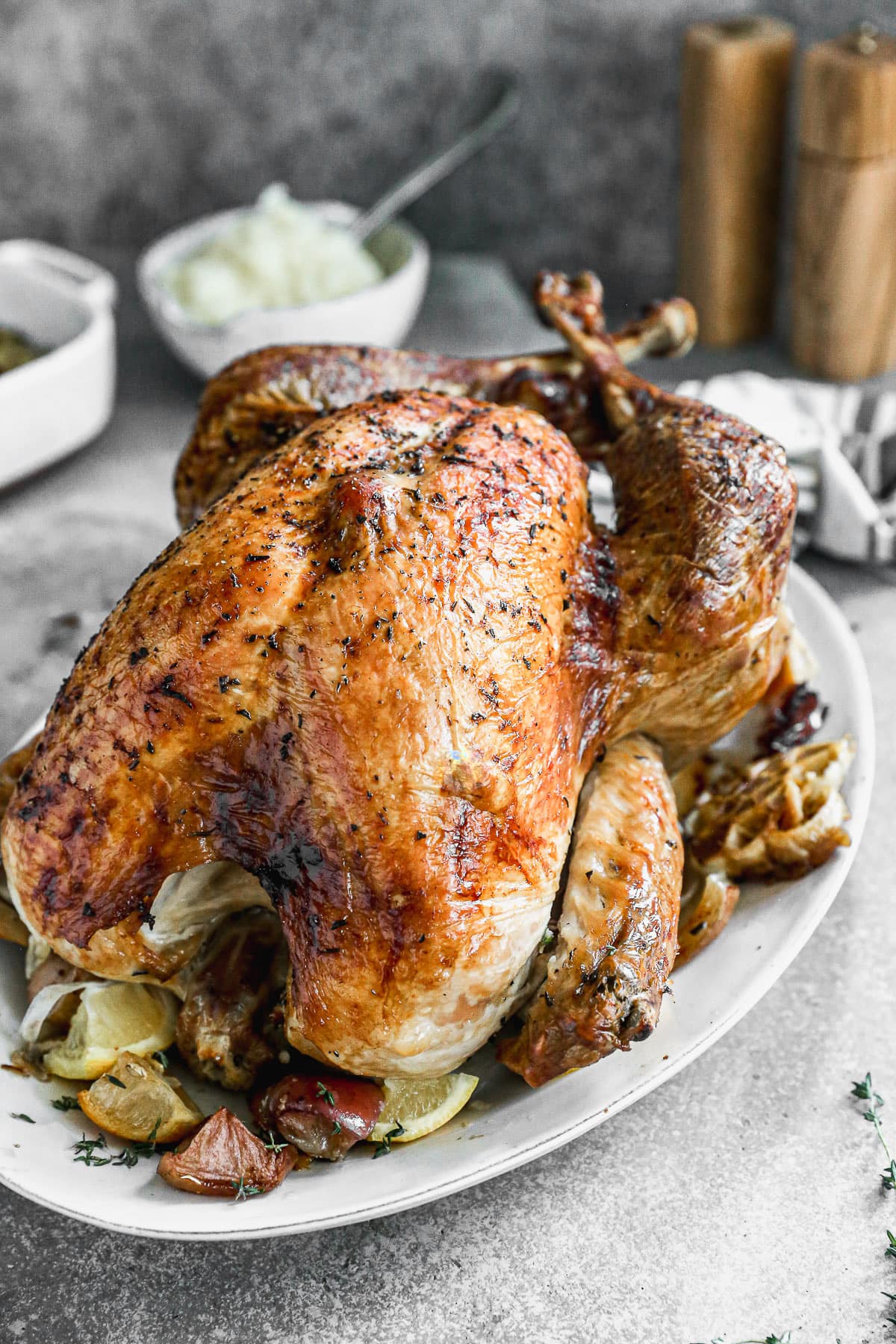THIS IS IT! The best Thanksgiving Turkey recipe. I’ve been roasting turkey for more than 15 years. The greatest tips I’ve learned are combined in this post to help you learn how to cook an oven-baked turkey that will be juicy, tender, and the highlight of your meal. It’s 100% doable and easier than you think!.
Are you ready to impress your guests this holiday season with a perfectly cooked young turkey? This comprehensive guide will walk you through every step, from choosing the right bird to achieving a juicy and flavorful centerpiece for your festive table.
Choosing the Perfect Young Turkey:
- Size: Opt for a young turkey weighing around 8-12 pounds. Young turkeys have tender meat that cooks evenly and boasts a richer flavor.
- Quality: Look for a bird with a plump breast and moist skin. Avoid turkeys with any signs of damage or discoloration.
- Freshness: Choose a fresh turkey that has been properly refrigerated. If purchasing a frozen turkey, ensure it has been thawed safely in the refrigerator.
Preparing the Young Turkey:
- Remove the giblets and neck: These are typically found in the cavity of the bird. Discard them or save them for making gravy.
- Rinse and pat dry: Rinse the turkey inside and out with cold water and pat it dry with paper towels. This removes excess moisture and promotes crispy skin.
- Seasoning is key: Create a flavorful rub by combining your favorite herbs and spices, such as rosemary, thyme, garlic powder, salt, and pepper. Rub this mixture all over the turkey, both on the outside and under the skin, for maximum flavor.
Cooking the Young Turkey:
- Preheat your oven to 325°F (165°C).
- Place the turkey on a rack in a roasting pan and loosely cover it with aluminum foil. This helps retain moisture and prevents the skin from over-browning.
- Cook the turkey for an estimated 13 minutes per pound, or until the internal temperature reaches 165°F (74°C) when measured with a meat thermometer inserted into the thickest part of the thigh.
- Baste for moisture: Every 30 minutes, remove the foil and use a turkey baster or spoon to drizzle the pan juices over the turkey. This helps keep the meat moist and adds extra flavor.
- Let it rest: After your young turkey is cooked to perfection, resist the temptation to carve it right away. Allow the turkey to rest for at least 20 minutes before slicing. This resting period allows the juices to redistribute, resulting in a more tender and flavorful turkey.
Tips for a Perfect Young Turkey:
- Use a meat thermometer to ensure accurate cooking.
- Basting is optional, but it can add extra flavor and moisture.
- Don’t overcook the turkey, as this can lead to dry meat.
- Let the turkey rest before carving to allow the juices to redistribute.
Additional Resources:
- How to Cook a 10-Pound Turkey in the Slow Cooker: https://tastesbetterfromscratch.com/how-to-cook-a-10-pound-turkey-in-the-slow-cooker/
- Easy, No-Fuss Thanksgiving Turkey: https://tastesbetterfromscratch.com/easy-no-fuss-thanksgiving-turkey/
With these tips and the provided resources, you’ll be well on your way to cooking a delicious young turkey that will have everyone asking for seconds.
Then: Reduce the Oven Temperature to 325° F and Keep Roasting
325°F is the best temperature for roasting turkey.
- If you go higher for an extended length of time, the tender white meat will cook too quickly.
- Any lower and it will take much longer for some of the juices to gradually dry out.
325°F is the sweet spot for cooking turkey!

Checking Turkey for Doneness
An instant read thermometer should be inserted into the thickest part of the breast and the inside of the thigh in order to properly test the doneness of your turkey.
- Stay as close to the bone as you can without touching it when inspecting the thigh.
- To ensure that your thermometer reads lower than the temperature of the meat, make sure you are not puncturing all the way through the skin into the turkey cavity.
- The pop-out thermometers that some turkeys come with are not very accurate, and you risk overcooking the bird.
- This type of digital read thermometer is very affordable and worth using to avoid contaminating your turkey!

How to Cook a Turkey
FAQ
Is it better to cook a turkey at 325 or 350?
What temperature is a young turkey done?
Should you bake a turkey covered or uncovered?
How long do you cook a young Turkey?
This will ensure that the turkey is cooked through and safe to eat. How long should I cook a young turkey? The cooking time for a young turkey will vary depending on its size. A general rule of thumb is to cook a turkey for 15 minutes per pound, or until the internal temperature reaches 165 degrees Fahrenheit.
Can one have turkey and carrots?
Eating turkey and carrots is part of healthy habits. The turkey has meat like chicken and is another healthy poultry option. Carrots are rich in carotenoids, it is a source of vitamin A, fiber, potassium and vitamin B3.
How do you cook a young Turkey in a crock pot?
Cook Low and Slow When it comes to cooking a young turkey, slow and steady wins the race. Preheat your oven to 325°F (165°C). Place the turkey on a rack in a roasting pan and loosely cover it with aluminum foil. This helps to retain moisture and prevent the skin from over-browning.
Are young turkeys better than older turkeys?
If you’re lucky enough to have a young turkey, you’re in for a treat. Young turkeys are more tender and flavorful than older turkeys, and they cook up quickly. In this article, we’ll show you how to cook a young turkey to perfection. We’ll cover everything from choosing the right turkey to cooking it to perfection.
